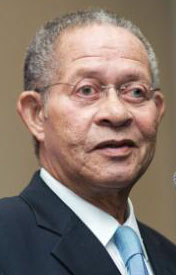Former Jamaican Prime Minister Bruce Golding on Friday took regional governments to task for failing to implement decisions necessary for the achievement of a CARICOM Single Market and Economy (CSME).
Golding, who served as chair of the Jamaica CARICOM Review Commission, addressed the opening of a two-day stakeholder consultation on the CSME on Friday at the Ramada Georgetown Princess Hotel at Providence.
In his address, Golding, who gave credit to the Secretariat for the “considerable efforts” it has made to implement the CSME and to help member countries to fulfill their obligations, opined that the Secretariat is often made the scapegoat for CARICOM’s failures.

“It is not fair. It is not fair to the Secretary General. It is not fair to his staff,” Golding said, adding, “I wouldn’t want his job for five times his salary. The frustration that he must go through would be hazardous to my health.” His remarks brought some laughter among participants.
Golding stated that the implementation of decisions taken by heads of government “is primarily the responsibility of national governments”. “The Secretariat dare not even appear to be inserting itself into the affairs of member states’ policy making or decision- making process of national governments,” Golding stated.
He related that in discussions he has had with multilateral institutions that fund a lot of the implementation efforts of the Secretariat, they have expressed frustration at the response by governments.
In the Review Commission’s report, he related that there is “hardly any excuse” proffered by any member state as to why they have failed to implement the decisions.
He said the report lists unimplemented decisions, agreements awaiting signatures or ratification, policies requiring legislation or legislation not enacted and administrative steps not taken, as “issues that in some instances have been languishing for more than ten years.”
The report repeatedly noted that some matters which governments have floundered on for decades are less challenging than the matters to which they have not yet turned their attention. These include the question of macroeconomics, free movement, and movement of goods and services, which, Golding said, are essential to the creation of an economic space.
Questioning the reasons for inaction, he said he does not think it was the absence of courage as much as it is the need to delve deep into the CSME provisions which some governments think is “likely to do them more harm than good.”
Delving deeper into the provisions, he opined, is an issue the region has to confront. Golding referred to some comments and suggestions put forward by St Vincent and the Grenadines’ Prime Minister Dr Ralph Gonsalves, who also made a presentation at the event.
Not in my lifetime
Gonsalves said there is no clear
demarcation between the Single Market and the Single Economy and that he does not think that currency convertibility and the freedom of movement essential to the single market and economy will happen in five years.
Two reasons why the region cannot go to the Single Economy, he said, is because of the nature of the restrictive economies and their combined state of underdevelopment, and because units within CARICOM as currently constructed are unequally yoked.
“These are practical matters of life in production and reproduction,” Gonsalves stated, adding, “I don’t think they will happen in my lifetime. I think we should do the practical things we can do immediately and in the foreseeable future.”
He suggested that based on the current construct of the regional body, the Revised Treaty of Chaguaramas should be amended to allow for “a special carve-out” for the Organisation of Eastern Caribbean States (OECS), established in 2010, to accommodate its economic union.
Gonsalves called for the strengthening of Chapter 7 of the Revised Treaty to better protect the interests of disadvantaged countries, regions and sectors.
Further, he urged the consolidation and extension of “the efficacious operation of functional cooperation, security arrangements, foreign policy coordination, and the trade/single market activities.
On foreign policy coordination, he said, “we cannot say we have been a great success,” while revealing that there are several governments in the region “lined up with the United States of America to give them an opportunity possibly to invade Venezuela.”
The Prime Minister also called for revamping of CARICOM’s governance structure, upgrading and enhancing of the structure and functioning of the Secretariat, improvement of intra CARICOM air and sea travel, and the settling of a bundle of outstanding matters.
Among the major outstanding issues for his country, he said, are the pricing and trade in energy supplies, the restriction on availability of foreign exchange to small traders who sell their commodities in Trinidad and Tobago (TT) and the failure of the government of TT to pay in part or in whole the outstanding sum of US$64 million owed to policy holders in OECS countries on account of the collapse of TT former insurance giant, CL Financial.






